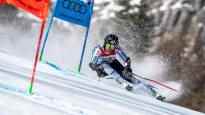Samu Torsti’s new training team will survive later. Training with the Finnish national team is not excluded.
Grand Slammer Samu Torsti, 30, continues his career. An experienced alpine skier who competed in the three Winter Olympics confirms the matter to Urheilu.
The season that ended in March was very difficult for Torst. For the Finns, the grand slalom race at the Beijing Olympics ended in suspension. In the World Cup, Torsti only scored for the rest of the season in Slovenia, where he was 29th.
The decision to continue his career was confirmed two weeks ago. He admits that his long career and various difficulties have tested the motivation of an athlete who has already competed in the 2011 World Cup.
– The decision took a surprisingly long time this year. We had to balance my own mind first in order to be able to make the right decisions, Torsti says.
Torsti names new learning as one of the important factors for the future. The grand sledger has knowledge of what things he can still develop. That’s what motivates.
– A clear technical error was found during this period. It has caused an imbalance in the calculation. When the counting is unbalanced, there will be errors and the clock will not like.
– At some point there was such a feeling that there is nothing more to give. But then came a closer look at what things can be done better for themselves.
The next training environment is still open
Torsti practiced for the last couple of seasons with the Swedish national team. His training buddy was also focused on grand slalom Mattias Röngren.
However, the collaboration came to a halt when Röngren was injured in the final World Cup of the season. The broken cross-country keeps the Swedish skier out of the races for a long time.
– Our two-man team was hit hard because of that, Torsti says.
At the moment, it is still unclear in which group Torsti will train in the future. One possible option is for Torsti to train for two different national teams.
– The preparatory season and the actual competition season may go on different teams.
The Finnish alpine skiing national teams have recently undergone major changes, as both men and women are preparing for the future with the latest lessons. The men’s head coach is an Austrian Mario Raferzeder.
According to Torst, his return to the Finnish national team is a possible option.
– Other options may be explored. I have not been in contact with the union for a few weeks now. However, it is possible that I would be with the Finnish national team during the preparatory season, Torsti admits.
Injury-prone species
Finland currently has some good Alpine promises, but in recent years many of them have suffered injuries. The last person to be injured last season was 14th in Schladming’s slalom. Pink Nordic. He underwent knee surgery in early May and has been on the sidelines for nine months.
In recent years, injuries have occurred, among other things Erika Pykäläinen. Torsti, who has also been injured in his own career, points out that alpine skiing is a very risky sport in its entirety.
– The danger always lies in the next turn. Röngren, for example, broke his crossroads in a normal turn.
During the alpine skiing performance, the various joints are under constant strain. Torsti says that in alpine skiing, injury can also be caused by many other factors.
– We travel a lot. We sit a lot in the car. A masseuse and caregiver are not always available. In addition, you go to different time zones.
– I would say that the Finnish team has been spared quite a bit with minor injuries. Having seen the situation in Sweden, there are also four knee patients there at the same time. The problem is the same little everywhere.
Credit to an Austrian coach
Finland had four skiers at last winter’s Olympics, none of whom made it to the second round. In the World Cup, second-round investments have been low for a long time.
According to Torst, the national team has got rid of it in recent years Kalle Palanderin and Tanja Poutiainen legacy. He just thinks it’s a good thing.
– The environment was such that there was a hell of a hurry all the time. In that situation, the athlete’s step-by-step development will be left behind.
According to Thursday, the national team is currently doing a good job.
– For example, there are equal-numbered athletes on the men’s side, whose next step is in the European Cup, because none of them have succeeded yet. They were now brought in by an Austrian head coach who has been successful with British athletes in the European Cup.
– He probably has some vision of how to take the next step in the World Cup. It remains to be seen how it goes. However, I think the designation was particularly interesting.
